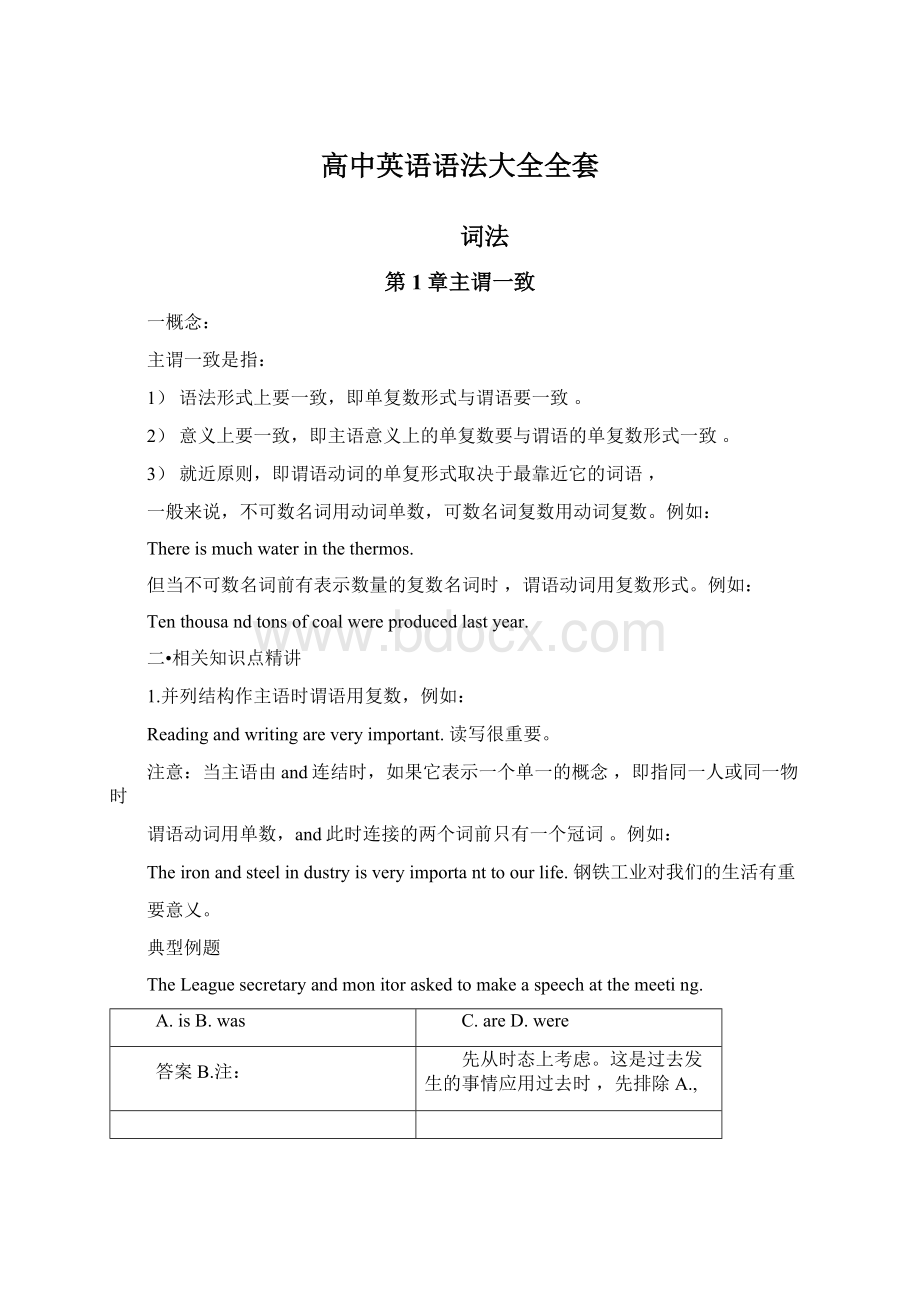高中英语语法大全全套Word文档下载推荐.docx
《高中英语语法大全全套Word文档下载推荐.docx》由会员分享,可在线阅读,更多相关《高中英语语法大全全套Word文档下载推荐.docx(117页珍藏版)》请在冰豆网上搜索。

Therearetwentyboy-studentsandtwenty-threegirl-studentsintheclass.班上有二十
个男孩,二十三个女孩。
2)当eitheror•…与neithernor,连接两个主语时,谓语动词与最邻近的主语保持一致。
如果句子是由here,there引导,而主语又不止一个时,谓语通常也和最邻近的主语一致。
Eitheryouorsheistogo.不是你去,就是她去。
Hereisapen,afewenvelopsandsomepaperforyou.给你笔、信圭寸和纸。
3.谓语动词与前面的主语一致
当主语有with,togetherwith,like,except,but,nolessthan,aswellas等词组成的短语
时,谓语动词与前面的主语部分一致。
Theteachertogetherwithsomestudentsisvisitingthefactory.教师和一些学生在
参观工厂。
HeaswellasIwantstogoboating.他和我想去划船。
4•谓语需用单数的情况
each,every时,谓语需用单数。
Eachofushasatape-recorder.我们每人都有录音机。
Thereissomethingwrongwithmywatch.我的表坏了。
2)当主语是一本书或一条格言时,谓语动词常用单数。
TheArabianNightisabookknowntoloversofEnglish.天方夜谭》是英语爱好者
熟悉的一本书。
3)表示金钱,时间,价格或度量衡的复合名词作主语时,通常把这些名词看作一个整
体,谓语一般用单数。
Threeweekswasallowedformakingthenecessarypreparations.用三个星期来做
准备。
Tenyuanisenough.十元够了。
5.指代意义决定谓语的单复数
1)代词what,which,who,none,some,any,more,most,all等词的单复数由其指代的
词的单复数决定。
Allisright.一切顺利。
Allarepresent.人都到齐了。
2)集体名词作主语时,谓语的数要根据主语的意思来决定。
女口family,audienee,crew,
crowd,class,company,committee等词后,谓语动词用复数形式时强调这个集体中的各
个成员,用单数时强调该集体的整体。
Hisfamilyisn'
tverylarge.他家成员不多。
Hisfamilyaremusiclovers.他家个个都是音乐爱好者。
但集合名词people,police,cattle,poultry等在任何情况下都用复数形式。
等有时看作单数,有
3)有些名词,女口variety,number,population,proportion,majority
时看作复数。
Anumberof+名词复数+复数动词。
Thenumberof+名词复数+单数动词。
Anumberofbookshavelentout.
ThemajorityofthestudentslikeEnglish.
6.与后接名词或代词保持一致的情况
1)用halfof,mostof,noneof,heapsof,lotsof,plentyof等引起主语时,谓语动词通常
与of后面的名词/代词保持一致。
Mostofhismoneyisspentonbooks.他大部分的钱化在书上了。
Mostofthestudentsaretakinganactivepartinsports.大部分学生积极参与体育
运动。
等引起主语时,谓语动词通常用单数
媒体报道了一连串的事故。
炉边有一堆木柴。
2)用aportionof,aseriesof,apileof,apanelof例女口:
Aseriesofaccidentshasbeenreported.
Apileoflotswassetbesidethehearth.
3)如manya或morethanone所修饰的短语作主语时,谓语动词多用单数形式。
但由
morethan…of作主语时,动词应与其后的名词或代词保持一致。
Manyapersonhasreadthenovel.许多人读过这本书。
Morethan60percentofthestudentsarefromthecity.百分之六十多的学生来自这
个城市。
三.巩固练习
()1.Thenumberofpeopleinvited
absentfordifferentreasons.
A.were,was
fifty,butanumberofthem
B.was,was
C.was,wereD.were,were
()2.E-mail,aswellastelephones,animportantpartindaily
communication.
A.isplaying
B.haveplayed
C.areplaying
D.play
()3.ofthelandinthatdistrict
coveredwithtreesandgrass.
A.Twofifth,is
B.Twofifth,are
C.Twofifths,is
D.Twofifths,are
()4.Tenminutes
A.seem
alongtimeforonewhowaits.
B.seems
C.seemedD.areseemed
()5.Ericistheonlyoneoftheboyswhoadrivinglicense.
A.hasB.have
C.ishavingD.arehaving'
()6.JoyandSorrownext-doorneighbours.
A.isB.areC.wereD.be
()7.Inmyopinion,someofthenewsunbelievable.
A.areB.isC.hasbeenD.havebeen
()8.WhentheUnitedNationsfounded?
A.is
B.are
C.was
D.were
()9.Everypossiblemeans
A.hastried
B.hasbeentried
C.wastried
D.weretried
nothingtodowithme.
()10.Whatshesaysanddoes
A.was
B.wereC.hasD.have
()11.Thereadictionaryandseveralbooksonthedesk.
B.
A.are
mustC.havebeenD.is
()12.Nobodyseenthefilm.It'
apity.
A.butTomandJackhave
B.exceptTomandJackhave
C.butmyfriendshas
D.butIhave
()13.Noteacherandnostudent
A.areadmitted
B.isadmitted
C.areadmitting
D.isadmitting
()14.Allbutoneherejustnow.
A.isB.wasC.hasbeenD.were
()15.Whenandwheretobuildthenewfactoryyet.
A.isnotdecided
B.arenotdecided
C.hasnotdecided
D.havenotdecided
()16.Thewriterandsingerhere.
A.isB.areC.wereD.do
withyou.
A.areB.wasC.isD.were
(
)
18.InthosedaysJohnwithhisclassmates
keptbusypreparingfor
theexam.
19.——
yourclothes?
No,mine
hangingoverthere.
A.Isit,is
B.Arethese,are
C.Isit,are
D.Arethese,is
20.TheSmith'
family,whichratheralargeone,
veryfondoftheir
oldhouses.
A.were,were
C.were,was
D.was,were
21.Whattheteacherandthestudentswanttosay
thateitherofthe
countriesbeautiful.
A.are,areB.is,is
C.are,isD.is,are
()22.Heistheonlyoneofthestudentswhoawinnerofscholarshipfor
threeyears.
A.isB.are
C.havebeenD.hasbeen
()23.ofmybrothersarereporters.Coveringevents,meetings,orsports
meetingstheirduty.
A.Each,areB.Both,is
C.Neither,areD.None,is
()24.Whatdoyouthinkoftheofthecoat?
Itsratherhigh.Youcanbuyacheaperoneinthatshop.
A.valueB.costC.priceD.use
()25.Arethetwoanswerscorrect?
No,correct.
A.nooneisB.botharenot
C.neitherisD.eitherisnot
()26.Thewind,togetherwithrainandfog,makingsailingdifficult.
A.havebeenB.was
C./D/are
四.答案
1.C
2.A
3.C
4.B5.A
6.B7.B8.C9.B
10.C11.D12.
C
13.B
14.D
15.A16.A
17.C18.C19.B20.D
21.B22.D23.
B
24.C
25.C
26.B
第2章
动词的时态
一一一
概念:
时态是英语谓语动词的一种形式
,表示动作发生的时间和所处的状态
.英语中的时态是通
在时,一般过去时,一般将来时,过去将来时,现在进行时,过去进行时,将来进行时,过去完成时,英在完成时和现在完成进行时.
1.一般现在时的用法
1)经常性或习惯性的动作,常与表示频腮度的时间状语连用。
时间状语:
every
sometimes,at…,onSunday例如>:
Ileavehomeforschoolat7everymorning.每天早上我七点离开家。
2)客观真理,客观存在,科学事实。
Theearthmovesaroundthesun.地球绕太阳转动。
ShanghailiesintheeastofChina.上海位于中国东部。
3)表示格言或警句。
Pridegoesbeforeafall.骄者必败。
此用法如果出现在宾语从句中,即使主句是过去时,从句谓语也要用一般现在
时。
例:
Columbusprovedthattheearthisround.哥伦布证实了地球是圆的。
4)现在时刻的状态、能力、性格、个性。
Idon'
twantsomuch.我不要那么多。
AnnwritesgoodEnglishbutdoesnotspeakwell.安英语写得不错,讲的可不行。
比较:
NowIputthesugarinthecup.把糖放入杯子。
Iamdoingmyhomeworknow.我正在做功课。
第一句用一般现在时,用于操作演示或指导说明的示范性动作,表示言行的瞬间动
一般现在时。
2.一般过去时的用法
1)在确定的过去时间里所发生的动作或存在的状态。
时间状语有:
yesterday,
lastweek,anhourago,theotherday,in1982等。
Wheredidyougojustnow?
刚才你上哪儿去了?
2)表示在过去一段时间内,经常性或习惯性的动作。
WhenIwasachild,Ioftenplayedfootballinthestreet.我是个孩子的时候,常在马
路上踢足球。
WhenevertheBrownswentduringtheirvisit,theyweregivenawarmwelcome.
那时,布朗一家无论什么时候去,都受到热烈欢迎。
3)句型:
Itistimeforsb.todosth"
到时间了"
"
该了"
。
例如:
Itistime
foryoutogotobed.你该睡觉了。
Itistimethatsb.didsth."
时间已迟了”"
早该了"
例如Itistimeyou
wenttobed.你早该睡觉了。
would(had)rathersb.didsth.表示'
宁愿某人做某事'
I'
dratheryoucametomorrow.还是明天来吧。
4)wish,wonder,think,hope等用过去时,作试探性的询问、请求、建议等,而一般过去时表示的动作或状态都已成为过去,现已不复存在。
Ithoughtyoumighthave
some.我以为你想要一些。
Christinewasaninvalidallherlife.(含义:
她已不在人间。
Christinehasbeenaninvalidallherlife.(含义:
她现在还活着)
(含义:
达比太太已不再住在肯
Mrs.DarbylivedinKentuckyforsevenyears.
塔基州。
Mrs.DarbyhaslivedinKentuckyforsevenyears.
现在还住在肯塔基
州,有可能指刚离去)
用过去时表示现在,表示委婉语气
1)动词want,hope,wonder,think,intend
等。
Didyouwantanythingelse?
您还要些什么吗?
Iwonderedifyoucouldhelpme.
能不能帮我一下。
2)情态动词could,would。
例如
Couldyoulendmeyourbike?
你的自行车,能借用一些吗?
3.—般将来时
1)shall用于第一人称,常被will
所代替。
will在陈述句中用于各人称,在征求意见
时常用于第二人称。
WhichparagraphshallIreadfirst
?
我先读哪一段呢?
Willyoubeathomeatseventhisevening?
今晚七点回家好吗?
2)begoingto+不定式,表示将来。
a.主语的意图,即将做某事。
Whatareyougoingtodotomorrow?
明天打
算作什么呢?
b.计划,安排要发生的事。
Theplayisgoingtobeproducednextmonth
这出戏下月开播。
c.有迹象要发生的事。
例女口:
Lookatthedarkclouds,thereisgoingtobeastorm.
看那乌云,快要下雨了
WearetodiscussthereportnextSaturday.我们下星期六讨论这份报告。
4)beaboutto+不定式,意为马上做某事。
HeisabouttoleaveforBeijing.他马上要去北京。
beabouttodo不能与tomorrow,nextweek等表示明确将来时的时间状语连
用。
4.一般现在时表将来
1)下列动词come,go,arrive,leave,start,begin,return的一般现在时可以表示将来,主
要用来表示在时间上已确定或安排好的事情。
Thetrainleavesatsixtomorrowmorning.火车明天上午六点开。
Whendoesthebusstar?
Itstarsintenminutes.汽车什么时候开?
十分钟后。
2)以here,there等开始的倒装句,表示动作正在进行。
Herecomesthebus.=Thebusiscoming.车来了。
Theregoesthebell.=Thebellisringing.铃响了。
3)在时间或条件句中。
WhenBillcomes(不是willcome),askhimtowaitforme.比尔来后,让他等
我。
我到了那里,就写信给你。
等的宾语从句中。
我希望他们下星期玩得开心
niwritetoyouassoonasIarrivethere.
4)在动词hope,takecarethat,makesurethat
Ihopetheyhaveanicetimenextweek.
离开房间
Makesurethatthewindowsareclosedbeforeyouleavetheroom.
前,务必把窗户关了
5.用现在进行时表示将来
下列动词come,go,arrive,leave,start,begin,return等现在进行时可以表示将来。
例
如:
rmleavingtomorrow.明天我要走了。
Areyoustayingheretillnextweek?
你会在这儿呆到下周吗?
6.现在完